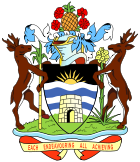You can help expand this article with text translated from the corresponding article in Spanish. (March 2024) Click [show] for important translation instructions.
|
| ||||||||||||||||||||||||||||
All 17 seats in the House of Representatives 9 seats needed for a majority | ||||||||||||||||||||||||||||
|---|---|---|---|---|---|---|---|---|---|---|---|---|---|---|---|---|---|---|---|---|---|---|---|---|---|---|---|---|
| Turnout | 55.92% | |||||||||||||||||||||||||||
| ||||||||||||||||||||||||||||
 Results by constituency | ||||||||||||||||||||||||||||
| ||||||||||||||||||||||||||||
 |
|---|
General elections were held in Antigua and Barbuda on 11 February 1971.[1] They were won by the Progressive Labour Movement. PLM leader George Walter was elected Premier of Antigua, defeating the incumbent Premier Vere Bird of the Antigua Labour Party. The PLM was founded in 1967 after a split in the leadership of the Antigua Trades and Labour Union; this was its first election, as well as its first and only electoral victory.
The 1971 election marked the first change of government in the history of Antigua and Barbuda. It was the first election held in the territory since its creation as a West Indies Associated State in 1967 and the end of its period under British colonial rule. Voter turnout was 56.4%.[1]
- ^ a b Dieter Nohlen (2005) Elections in the Americas: A data handbook, Volume I, p66 ISBN 978-0-19-928357-6

